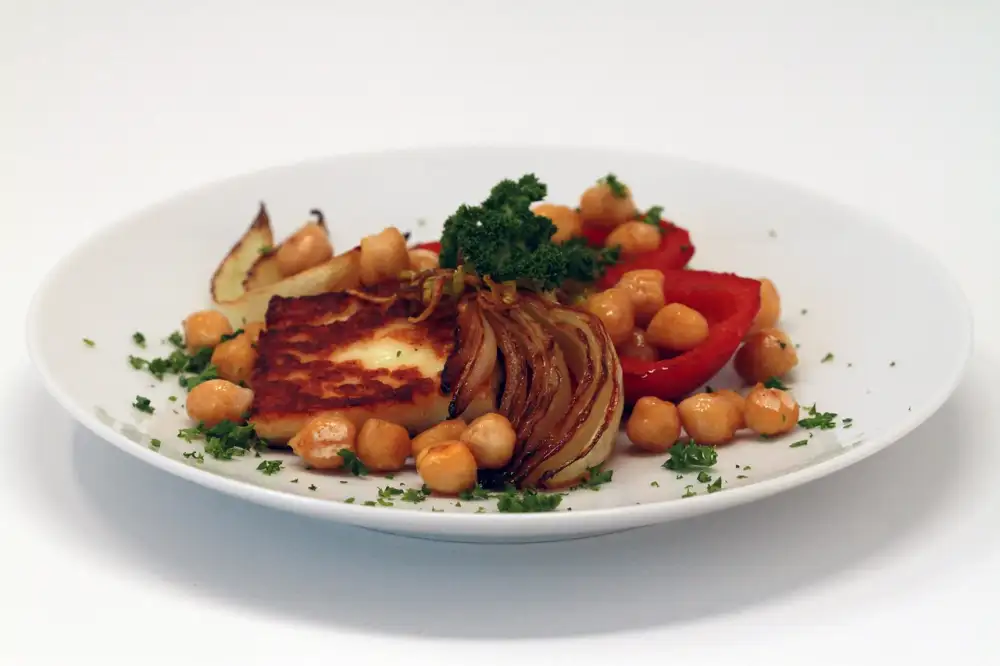Unveiling the Savory Secrets of Halloumi: A Culinary Delight for Cheese Lovers

- The Origins of Halloumi: A Traditional Cypriot Cheese
- The Unique Characteristics of Halloumi: A Cheese That Doesn't Melt
- Halloumi's Distinctive Taste and Texture: A Delight for Cheese Lovers
- Culinary Uses of Halloumi: From Grilling to Salads and Beyond
- Halloumi Recipes: Exploring Creative Ways to Enjoy this Cheese
- Health Benefits of Halloumi: A Nutritious Addition to Your Diet
- Halloumi Around the World: Its Growing Popularity and Global Appeal
- Tips for Buying and Storing Halloumi: Ensuring Freshness and Quality
Halloumi, a versatile cheese with a rich history, is a true culinary delight for cheese lovers. Originating from the Mediterranean island of Cyprus, this unique cheese has captivated taste buds around the world. With its distinctive taste and texture, halloumi has become a favorite ingredient in many dishes. Whether grilled, fried, or used in salads, halloumi adds a burst of flavor to any meal. Join us as we unveil the savory secrets of halloumi and explore its fascinating journey through time.
The Origins of Halloumi: A Traditional Cypriot Cheese
Halloumi, a traditional Cypriot cheese, has a rich history that dates back centuries. It is believed to have originated in the island of Cyprus, where it has been made for generations. The exact origins of halloumi are unclear, but it is thought to have been influenced by the Byzantine and Arab cultures that once occupied the region. Today, halloumi is still predominantly produced in Cyprus, where it holds a special place in the local cuisine and culture. Its unique taste and texture have made it a beloved cheese not only in Cyprus but also around the world.
The Unique Characteristics of Halloumi: A Cheese That Doesn't Melt
Halloumi is a cheese unlike any other, thanks to its unique characteristic of not melting when heated. This quality sets it apart from most other cheeses and makes it an ideal choice for grilling or frying. While other cheeses would turn into a gooey mess on the grill, halloumi retains its shape and develops a delicious golden crust. Its firm texture allows it to hold up well under high heat, making it perfect for adding a satisfyingly crispy exterior to dishes. Whether you're looking to add some excitement to your salads or create a mouthwatering burger, halloumi's non-melting nature is sure to elevate your culinary creations.
Halloumi's Distinctive Taste and Texture: A Delight for Cheese Lovers
Halloumi's distinctive taste and texture make it a true delight for cheese lovers. With its salty and tangy flavor, halloumi offers a unique sensory experience that sets it apart from other cheeses. Its firm and rubbery texture adds an enjoyable chewiness to every bite. Whether grilled, fried, or eaten fresh, halloumi's taste and texture provide a satisfying and indulgent experience that is sure to please even the most discerning cheese connoisseur.
Culinary Uses of Halloumi: From Grilling to Salads and Beyond
Halloumi's unique characteristics make it a versatile cheese that can be used in various culinary creations. One popular way to enjoy halloumi is by grilling it. When grilled, the cheese develops a deliciously crispy exterior while maintaining its soft and chewy texture on the inside.
In addition to grilling, halloumi is also commonly used in salads. Its salty flavor and firm texture provide a delightful contrast to fresh greens and other salad ingredients. Simply slice the cheese and toss it into your favorite salad for an extra burst of flavor.
But the uses of halloumi don't stop there. This cheese can be fried, baked, or even used as a topping for pizzas and sandwiches. Its ability to hold its shape when heated makes it an excellent choice for cooking methods that require a cheese that doesn't melt.
Whether you're looking to add some excitement to your summer barbecues or want to elevate your everyday salads, halloumi is sure to impress with its versatility in the kitchen. So go ahead, get creative with this delightful cheese and discover new ways to delight your taste buds!
Halloumi Recipes: Exploring Creative Ways to Enjoy this Cheese
Halloumi, with its unique taste and texture, offers endless possibilities in the kitchen. Here are some creative ways to enjoy this versatile cheese:
1. Grilled Halloumi Skewers: Thread cubes of halloumi onto skewers with cherry tomatoes and bell peppers. Grill until golden brown for a delicious appetizer or main course.
2. Halloumi Salad: Toss sliced halloumi with mixed greens, cherry tomatoes, cucumbers, and olives. Drizzle with olive oil and lemon juice for a refreshing summer salad.
3. Halloumi Burgers: Replace the traditional meat patty with grilled halloumi slices. Top with lettuce, tomato, and your favorite condiments for a flavorful vegetarian burger.
4. Halloumi Fries: Cut halloumi into thick strips and coat them in breadcrumbs. Fry until crispy and serve as a tasty alternative to regular french fries.
5. Halloumi Pizza: Use thinly sliced halloumi as a topping on homemade pizzas. Pair it with roasted vegetables or fresh herbs for an irresistible combination.
6. Halloumi Wraps: Fill warm tortillas with grilled halloumi, avocado slices, lettuce, and salsa for a quick and satisfying lunch option.
These recipes showcase the versatility of halloumi, allowing you to experiment and create dishes that will delight your taste buds.
Health Benefits of Halloumi: A Nutritious Addition to Your Diet
Halloumi not only satisfies your taste buds but also offers several health benefits. This cheese is a good source of protein, which is essential for muscle growth and repair. It also contains calcium, promoting strong bones and teeth. Additionally, halloumi provides vitamins A and B12, supporting healthy vision and nerve function. Despite its saltiness, halloumi is lower in sodium compared to other cheeses. However, moderation is key due to its high saturated fat content. Enjoy halloumi as part of a balanced diet for a nutritious and delicious treat.
Halloumi Around the World: Its Growing Popularity and Global Appeal
Halloumi, once a well-kept secret of Cypriot cuisine, has now gained global recognition and popularity. This versatile cheese has captured the hearts (and taste buds) of food enthusiasts around the world. From Europe to North America, halloumi can be found in various supermarkets, specialty stores, and even on restaurant menus. Its unique taste and texture have made it a favorite among cheese lovers everywhere. Whether grilled, fried, or incorporated into salads, halloumi's global appeal continues to grow as more people discover its savory secrets.
Tips for Buying and Storing Halloumi: Ensuring Freshness and Quality
When buying halloumi, it is important to choose a cheese that is fresh and of high quality. Look for halloumi that has a firm texture and a slightly salty aroma. Avoid any cheese that appears discolored or has an unpleasant odor. It is also recommended to buy halloumi from reputable sources or specialty stores that specialize in Mediterranean cuisine.
To ensure the freshness of halloumi, it should be stored properly. Keep the cheese wrapped tightly in its original packaging or in a resealable plastic bag. Place it in the refrigerator, preferably in the coldest part, such as the vegetable drawer. Halloumi can be stored for up to two weeks if kept refrigerated.
Before using halloumi, make sure to check for any signs of spoilage, such as mold or an off smell. If the cheese has been opened but not used entirely, it is best to wrap it tightly again before returning it to the refrigerator.
By following these tips for buying and storing halloumi, you can ensure that you are enjoying a fresh and high-quality cheese that will truly delight your senses.
In conclusion, Halloumi is truly a cheese that delights the senses. Its rich history, unique characteristics, and distinctive taste make it a favorite among cheese lovers. From grilling to salads and beyond, Halloumi offers endless culinary possibilities. Not only is it delicious, but it also provides numerous health benefits. As its popularity continues to grow around the world, be sure to buy and store Halloumi properly to ensure freshness and quality. So go ahead and indulge in the savory secrets of Halloumi – your taste buds will thank you!
Published: 24. 11. 2023
Category: Food



